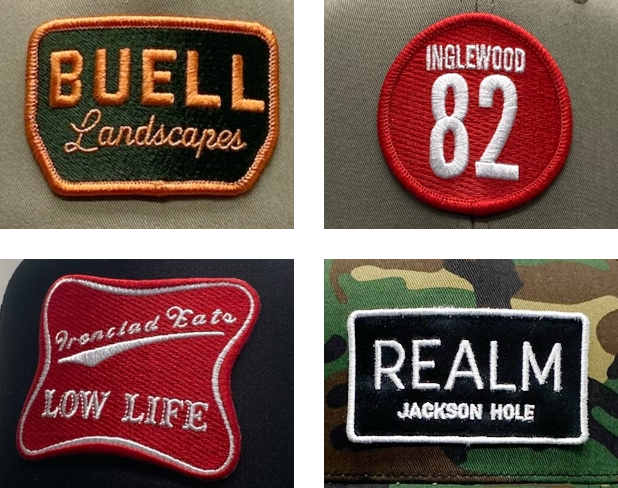Embroidered patches are a classic decoration method and work great with custom logo apparel including custom hats and caps, custom bags, and more. Embroidered patches have been around for a long-time and are popular with many customers, since they offer a higher level of detail than regular embroidery and give your apparel item a classic and refined look.


Embroidered patches can also be used as a standalone item to promote your organization, team, national park, school, college, event, and more. Embroidered patches, along with patches in general, are a popular collector’s item as well. Embroidered patches cost slightly more than regular custom embroidery, but the patches can offer more detail than regular embroidery and furthermore, can really add a higher-end look to apparel items or custom logo products and these items can be resold at a higher price.
Embroidered patches come in many shapes and are stitched or heat press applied to the apparel item such as a custom hat. Simple shape patches (i.e. basic round shapes or square shapes) can have either a merrowed edge or satin stitch edge and are usually hand stitched to the custom apparel item. Complex shape patches have only a satin stitch edge and are usually heat press applied.
Embroidered patches can be made extremely small or large depending upon your logo or design and the product you would like it applied on or if purchasing as a standalone patch.
We also offer hook-and-loop patches. Embroidery is offered on the loop side of patches only and the patches are stitch applied to the apparel item with a running stitch tack down. Hook-and-loop patches are popular with many, since they can be easily interchanged with various patches and may work well for uniforms, flags, and emblems.
Embroidered patches can have two types of edges - a merrowed edge or a satin stitch edge. The merrowed edge, which is usually the standard patch edge or border, wraps around the edge of a patch, while a satin stitch edge is on top of the patch. A merrowed edge can help prevent fraying for the patch and this overlaps on the patch’s edge. A satin stitch edge is usually slightly thinner and does not overlap the patch’s edge.